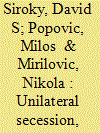|
|
|
Sort Order |
|
|
|
Items / Page
|
|
|
|
|
|
|
| Srl | Item |
| 1 |
ID:
159619


|
|
|
|
|
| Summary/Abstract |
Latino Democrats, Latino Republicans and Interest in Country of Origin Politics
NIKOLA MIRILOVIC and PHILIP H. POLLOCK III analyze 2012 American National Election Study data to examine why some Latino U.S. citizens, but not others, maintain an interest in their country of origin politics. They argue that party identification helps explain this variation and that Republicans are less likely than Democrats to maintain an interest.
|
|
|
|
|
|
|
|
|
|
|
|
|
|
|
|
| 2 |
ID:
160770


|
|
|
|
|
| Summary/Abstract |
Why do some diaspora groups, but not others, play a prominent role in the formalization of cooperative political ties between their country of origin and their country of residence? This article adopts a novel dyadic approach to the study of diaspora politics by arguing that diaspora politics are simultaneously structured by regime type in the country of origin and in the country of residence. Diaspora groups can play a prominent role in the formalization of cooperative foreign policy ties between their country of origin and their country of residence in democracy–democracy dyads (i.e., when the country of origin and the country of residence are both democratic). In all other dyads (including authoritarian–authoritarian), diaspora groups’ political impact on the formalization of cooperative foreign policy ties tends to be limited. The democracy–democracy dyad approximates a necessary (but not a sufficient) condition; nationalism and international economic strategies adopted by the country of origin help shape diaspora politics. This article examines all four regime type dyads by focusing on diaspora politics in authoritarian Malaysia and democratic United States, which have notable populations of Chinese and of Indian origin.
|
|
|
|
|
|
|
|
|
|
|
|
|
|
|
|
| 3 |
ID:
182671


|
|
|
|
|
| Summary/Abstract |
Recognition of aspiring states from established countries is central to becoming a member state of the international system. Previous research suggests that great power recognition decisions regarding aspiring states rapidly converge toward either recognition or non-recognition, yet great power convergence has still not occurred in the case of Kosovo after more than ten years. Unilateral secessions typically remain wholly unrecognized, since they violate the norm of home state consent, yet Kosovo has now been recognized by more than 100 countries. Why do some countries extend recognition to unilateral secessions, and do so early, whereas others delay recognition or withhold it altogether? In the case of Kosovo, great power influence and contestation, rather than convergence, have played a key role in shaping recognition decisions. We argue that countries in the US sphere of influence, with strong economic and military ties, are more likely to recognize Kosovo and to do so relatively fast, whereas countries influenced by Russia are less likely to recognize Kosovo at all, or to do so only after an extended delay. However, great powers are not equal in influencing other states to adopt their preferred position, since the USA is more powerful than Russia and can benefit from working alongside allies within the Western-oriented world order. We estimate a non-proportional Cox model with new time-varying data on Kosovo recognition and provide evidence that US military ties influenced other countries in extending recognition to unilateral secession.
|
|
|
|
|
|
|
|
|
|
|
|
|
|
|
|
|
|
|
|
|